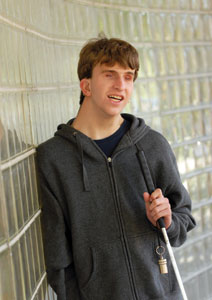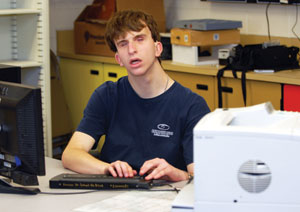 It’s becoming more and more popular for high school graduates to take a “gap” year before heading out to college. Most use it as a way to explore another part of the world or to spend time doing something they deem meaningful.
It’s becoming more and more popular for high school graduates to take a “gap” year before heading out to college. Most use it as a way to explore another part of the world or to spend time doing something they deem meaningful.
Tyler Kavanaugh is taking a gap year, too. But the 2011 Shawnee Mission East High School graduate is taking his at the Kansas State School for the Blind (KSSB) in Kansas City, Kan. Unlike those who take a gap year to step away from the rigors of formal education or to understand oneself better, Tyler’s gap year is preparing him to fly from the nest and live independently on his own.
Tyler was born with congenital hearing and sight problems. He can see little bits of color as well as light and dark, “but not enough to read.”
His hearing is enhanced by cochlear implants. He got the first one in his right ear when he was only 5 ½ years old. A cochlear implant, according to the National Institutes of Health, is a small, complex electronic device that can help to provide a sense of sound to a person who is profoundly deaf or severely hard-of-hearing. The implant consists of an external portion that sits behind the ear and a second portion that is surgically placed under the skin.
He got an implant in his left ear when he was 13.
“I wouldn’t hear anything without them, so I guess they are a great thing,” he said.
As soon as Tyler was born his parents, Kurt and Stephanie Kavanaugh, began advocating for him and making sure he was in all the right programs and schools to ensure that Tyler could live a happy, productive and independent life. His enrollment at KSSB is just the next step on that road for Tyler.
“I chose to do it because it would teach me the skills that I need to live on my own,” he explained in an interview at his home.
The school
Tyler is enrolled in KSSB’s Transition Program, which is a comprehensive and individualized program that aims to provide the skills and experiences to facilitate an effective transition from high school to adulthood and the world of work.
He attends the school Monday through Friday. The Shawnee Mission School District provides the transportation to and from the school, delivering him to school on Monday and returning him home at the end of the school week. In the dorm Tyler lives with students who are high-school age through transition, which is 21.
The transition program is tailored to fit the student’s needs. Tyler will be there just this school year. He is learning tasks, as Tyler explained, many of us learned by imitation.
“Some people have to take more than one year, but I don’t,” he said.
In addition to his classes at the School for the Blind, Tyler is also enrolled at Kansas City Kansas Community College. A teacher from KSSB drives the students to and from the community college in a van.
“This lets me get some of the freshman requirements out of the way and save a little money in terms of tuition and class expenses,” the 18-year-old student added.
At KSSB, Tyler is learning such things as cooking, cleaning and laundry.
“I haven’t had to do a whole lot of that stuff before,” he said.
His mother said that he is learning the skills that freshman boys don’t generally have “but can figure out on their own. It’s harder to figure out on your own when you can’t see what everybody else is doing.”
He especially enjoys some classes, such as woodshop.
“It’s really fun because the teacher actually lets us use a lot of tools. When I took the same class in middle school, the teacher did a lot of the cutting and drilling using the power tools and we just got to do the stuff with the hand tools. We do everything,” he said.
Fingers for blind people are especially important as they are used to read Braille. While some of the equipment KSSB uses in woodshop is designed especially to protect those fingers, Tyler said most is just regular equipment.
“I’m not worried about hurting myself. What is important is learning how to use the tools safely and if you use them safely the equipment won’t hurt you,” he said.
He’s proud of the 12 x 12 x 6 wooden box he’s built. He keeps it in his dorm room to store personal items.
 Academically at community college he just completed a course called Assistive Technology in the Work Place. It was a one-on-one class with an instructor, who also is blind, who discussed different programs and strategies that can be used to make things like computers work better for those who have visual impairments.
Academically at community college he just completed a course called Assistive Technology in the Work Place. It was a one-on-one class with an instructor, who also is blind, who discussed different programs and strategies that can be used to make things like computers work better for those who have visual impairments.
Mom Stefanie thinks it’s a good thing for KSSB students, like Tyler, to interact with the blind instructor at KCKCC, introducing the students to a blind person working successfully in the community.
Socially, Tyler said things can still be a little hard for him.
“Even though I’m in an environment where everybody else has vision impairments, the thing that’s hard for me is the hearing part,” he said. “If I’m out in the common area of the dorm, I can’t see if someone is wearing headphones and that’s why they don’t respond to me. Extra noise in the room can also be a problem.”
Stephanie Kavanaugh said she and Kurt are happy with Tyler’s experiences so far.
“We haven’t had any separation issues. Tyler has a very strong sense of self. He’s very confident about his current abilities or his ability to learn what he needs to know,” she said.
As a father, Kurt Kavanaugh thinks the program is good for Tyler and the family.
“It is a good program because he is planning to go to a college far away. I can’t just drive 30 minutes to KU if there is a problem. He needs to learn to take care of it and be responsible and be mature enough to get up and go to class on his own,” Kurt Kavanaugh said.
Tyler’s program has helped his mother as well.
“I have a tendency to hover a bit,” she said. “I think it’s a good transition for me as a parent to have him away but still coming home on the weekends. He can learn to do things on his own but I still get to check on him on the weekend and he can still be here for doctor appointments and haircuts and things. It’s not a complete separation all at once. It’s baby steps for the mother, too.”
Tyler said he is enjoying living away from home.
“But I miss home when I’m not here and I miss school when I’m not there,” he said.
The next step
Next year Tyler hopes to attend the Rochester Institute of Technology in Rochester, N.Y. and study software engineering.
“I think I can do it. I know I can do it,” he said.
Part of the reason he wants to go to Rochester is because The National Technical Institute for the Deaf is part of the university.
“If I apply through them, I get a tuition cut because of my hearing impairment,” said Tyler, who noted that of the 17,000 students, about 1,400 have a hearing impairment.
The school also has an audiology clinic on campus which is an important support for Tyler should he have a problem with one of his cochlear implant processors.
When he goes away to college, he will be a plane ride away from home versus the short distance he is now. But it won’t be the first time he has been away from home for an extended period of time. As a young camper, he spent five summers at Olin Sang Ruby Union Institute in Oconomowoc, Wis. He then spent two summers at the URJ Kutz Camp in Warwick, N.Y. This past summer he attended Camp Ramah in Wisconsin. It was a combination camp/vocational experience.
Tyler was the first camper in this program to have a visual impairment. Most of the campers have Asperger’s syndrome or are high functioning teens on the autistic spectrum.
“We all had a different job in town. Some people worked in the grocery store or the coffee shop or the library. I got one of the most unique jobs at a computer store. I was doing computer programming for them. That was because we wanted a job for me that would use my skill set. I thought it was a great match and a great fit,” he said.
Besides being his first job experience, this camp experience was the first time Tyler was responsible for being on his own, without a mother or a counselor, to do such things as get up and get to appointments on time.
“We found a talking, vibrating alarm clock for him to use,” Stephanie Kavanaugh said. “It was a challenge. You can usually find one for the hearing impaired or the visually impaired, but not both. This has a vibrating pad that goes under the pillow.”
Leisure activities included the typical camp activities such as hiking as well as bowling and miniature golf.
“I can do both just fine. Someone just has to line me up,” Tyler explained.
Mom said watching the video of the ropes course was harrowing for her, but Tyler said it was fun.
Tyler’s Judaism
A member of Congregation Beth Shalom, Tyler really enjoys reading Torah. That’s another challenge for him, one not based on his Hebrew skills but based on Jewish law. Conservative rabbis don’t all agree on whether it’s lawful to read the Torah using a chumash versus reading directly from the Torah scroll itself. Traditionalists insist the reader must be literally reading from the Torah if it is within the regularly required number of readings.
Tyler explained that he is allowed to read Maftir or a Hosofah, which are outside the minimum number, or he is allowed to read Haftarah.
Other authorities claim that this position should be changed to enable a serious Torah reader to read regardless of a disability.
Tyler stated, “I have read with one hand on the Braille and one hand on the scroll itself with someone guiding my hand. That way I would be reading basically the same line, but I thought that was way too cumbersome.”
Kurt Kavanaugh, who is president of Beth Shalom’s board, pointed out that if Tyler wants the practice changed at the congregation, it is his job to approach the ritual committee about making it. Tyler isn’t sure whether he will take such a stand.
“I think I’ll see what’s ahead. It’s up to different rabbis and different congregations,” he said.
Tyler is hoping to be able to attend Camp Ramah in Wisconsin again this summer, this time as a counselor. He is also confident that he is learning the skills he needs to go to college, go to Jewish camp and eventually work and live on his own.
“I feel that my experiences, both at camp and school, have prepared me well for college and my future, wherever it may happen to take me.”